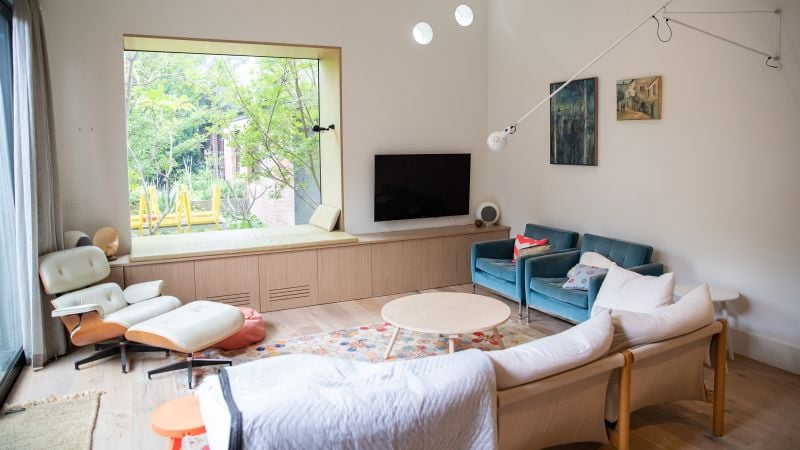…
Compared to other countries, America is known for bigger cars, portions and take-out coffee cup sizes. For most of recent history, Americans have also wanted bigger homes — but now that’s changing.
For most of the last half-century, new single-family homes kept growing. In 1973, the median size of completed single-family homes was 1,525 square feet, according to US Census data. By 2015, that number had ballooned to 2,467 square feet.
But as the cost of buying a home has exploded and McMansions have fallen out of favor, homebuilders have reversed course, building smaller homes with an eye to first-time buyers. In 2023, the median single-family home built was 2,233 square feet, down 9% from the 2015 peak, with many formal dining rooms and “bonus” rooms disappearing.
Carias and her partner ultimately settled on a roughly 920-square-foot home. To maximize space, they decided to use the basement as their primary bedroom.
On a related subject, this video goes pretty deep into real estate development and why American garages are shrinking.
But not cheaper
They’re only 386k(!)
Hey CNN, you dropped the most important value there buddy. I see median new construction is still 200k+ more than I can afford so…
WHAT’S THE PRICE!?
I don’t for one single millisecond believe that these “starter houses” will come with starter prices. You know, the whole goddamn reason we can’t buy anything…
They didn’t drop it. You didn’t read the article.
There are signs those efforts might be helping buyers get in the door: The median sales price of existing homes jumped to $426,900 in June, according to the National Association of Realtors, while the median price of new homes in June was $417,300, according to the US Census Bureau.
Okay I thought my guess was already ridiculous but what in the actual fuck?
I did read and it’s in my comment (in the form of “it’s 200k+ more than I can afford” referring to their median quote). They specifically say the median price of new homes, they didn’t specify these “starter homes” that the article is supposed to be about.
For most of recent history, Americans have also wanted bigger homes — but now that’s changing.
For most of recent history, there were no other options. We codified a lot of this into regulations.
“Young people are getting fucked by previous generations, and will have to make do with less. It’s pretty great for rich people, though!”
But have you tried being born wealthy?
CNN - News Source Context (Click to view Full Report)
Information for CNN:
MBFC: Left-Center - Credibility: High - Factual Reporting: Mostly Factual - United States of America
Wikipedia about this sourceSearch topics on Ground.News
https://www.cnn.com/2024/08/05/business/home-sizes-shrinking/index.html
Also, a smaller home makes adding an ADU to rent out easier on a standard lot. At least in high COL areas.
the lots are getting subdivided.
Ah, that works too.
Someone bought a home over my way and added a 2-story ADU in their backyard. They rent both units out. Probably pays for the mortgage completely.
I laugh when I pass that one. No idea how they got a 2-story permit for an ADU that is taller than it is wide in a 1-story neighborhood.
depends on local restrictions. in california i’m limited to 25 feet or as tall as the main house, whichever is lower.
This just means you’ll pay the same price for a smaller house.
Source: am australian
Welcome to German suburbs. Where the space between houses is the absolute minimum, the houses are only slightly larger than a reasonable apartment and every house looks exactly the same like in the 20 other new development areas around the city.
It’s the plastic version of the discount dream of wealth.
Yes, but they need to spread propaganda that the top 10% are not bleeding the rest if us dry.
“why sell 1 regular house on an acre when you can sell 10 tiny houses on the same acre?”
real estate investor
If they did that, they just might alleviate the massive supply shortage we ran into. That would actually be great.
If they did that, they just might alleviate the massive supply shortage we ran into. That would actually be great.
Here’s a rare example from San Antonio TX. These are small 600 sq ft homes, each with their won driveway, backyard, front yard with no shared walls with your neighbor. Priced at $135k.
If I were renting a one or two bedroom apartment, I’d much rather buy one of these instead.
That’s awesome. I live in an apartment that’s only a smidge more than 600 sqft, so that’s a good size for one person or a couple.
They are doing that. It’s really common to see a single family home with a decent but not big lot become 8 townhouses with no lot in big cities. Each townhouse costs roughly what the SFH cost the developers to buy.
Its more housing, but not at a pace that is fixing the issue, and you can argue the home buyers are getting way less out of it than they used to.
At least they’re getting better walkability out of the deal, and the local government won’t go bankrupt trying to maintain infrastructure serving them like the ones full of 1-acre lots will.
Building like that on those lots is often against zoning code. About 3/4 of all residential lots in the US are zoned for single family homes only, and though this is changing, you’re correct that it’s not fast enough. I’d be happy to get less than what my parents bought, when I’m ready to buy. As empty nesters now, they’ve easily got 4 times as much house as they actually need or use, and my mom in particular refuses to move. Friends of mine bought a place at the market rock bottom back in about 2012, and with no kids themselves, they also have far too much house, but that’s what was available.
These are in a major metropolitan area in the US and are fully legal where they are built.
They are modern, and in the case of new builds even include warranties for the first couple of years, but otherwise are pretty ass backwards on the “$/sqft” scale.
Its still denser housing in a place that needs it badly, but the price gouging is irritating to see.
I didn’t mean to imply that denser housing was being built illegally, only that the availability of it is a product of zoning codes forbidding it in most places. I don’t expect dollars per square foot to scale linearly in either case, and in my personal experience, when I ran the numbers about 7 years ago, moving from suburbia to a dense city ended up costing me almost exactly the same, because I no longer need a car here. You think differently about how much space you actually need when your social space is no longer a back yard or a living room and is instead a park or a nearby bar or something.
It takes less resources and money to keep a smaller house. Smaller repair bills, smaller utility bills and smaller amounts of maintenance. Smaller, more sustainable housing should require people to work less to afford to live.
Or it means, people get in way more debt than they can afford to buy a small low quality house, that costs more than a comparable apartment and doesn’t offer any of the benefits of a proper house.
We have those developments here in Germany and it’s awful. It looks like shit and I’m 80% sure that a significant part of the current owners could only afford their houses due to the low interest rates of the last decade. If they have to inevitably refinance, someone loses their job or a large unexpected expense happens, they’re absolutely fucked.
Kind of okay with this. I don’t really want to manage/clean a huge place. 2 bed, 1 bath, 1 car garage , and a little back yard is perfect for me as a single person. If it was priced reasonably, I would jump at it- but where I live they’d charge close to a mil and everything would start to fall apart in a year or two because of cut corners 😞
I have that, minus the yard, in my apartment. I pay $1,400/month in Austin, TX.
Pay MORE for LESS! It’s the American idiot way!
We just had our first and live in a two bed that’s “1500” sq feet I could not imaging a family of 4 or 5 living in smaller especially if 1 or both spouses work from home. I need a room to close the door at the end of the day to not look at work anymore
Oh yes, now I can definitely live in a 10 sqms apartment, yey
Shrinkflation has reached the real estate market.









